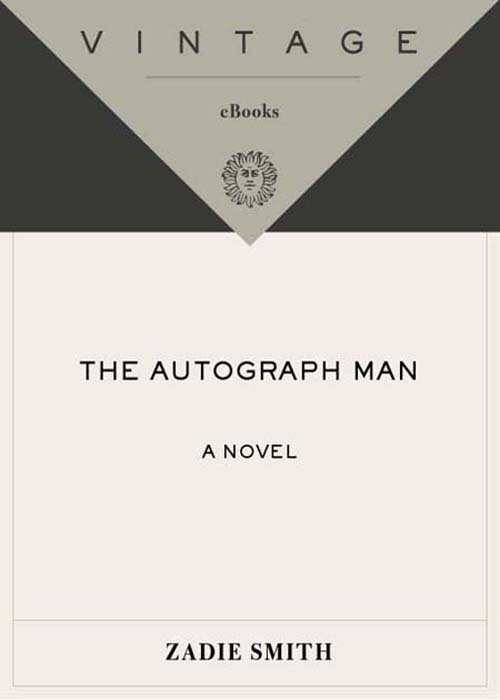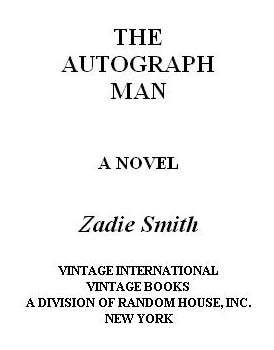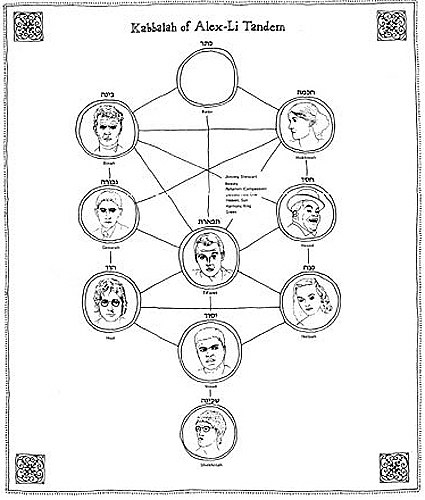The Autograph Man




TABLE OF CONTENTS
TO MY AMAZING BROTHERS, BEN AND LUKE,
AND FOR MY FRIEND ADAM ANDRUSIER,
WHO KNOWS FUNNY FROM FUNNY
Dig: I’m Jewish. Count Basie’s Jewish. Ray Charles is Jewish.
Eddie Cantor’s goyish. B’nai B’rith is goyish; Hadassah, Jewish.
If you live in New York or any other big city, you are Jewish.
It doesn’t even matter even if you’re Catholic; if you live in New York, you’re Jewish. If you live in Butte, Montana, you’re going to be goyish even if you’re Jewish.
Kool-Aid is goyish. Evaporated milk is goyish even if the Jews invented it. Chocolate is Jewish and fudge is goyish. Fruit salad is Jewish. Lime Jell-O is goyish. Lime soda is
very
goyish.
All Drake’s Cakes are goyish. Pumpernickel is Jewish and, as you know, white bread is very goyish. Instant potatoes, goyish. Black cherry soda’s very Jewish, macaroons are
very
Jewish.
Negroes are all Jews, Italians are all Jews. Irishmen who have rejected their religion are Jews. Mouths are very Jewish.
And bosoms. Baton-twirling is
very
goyish.
Underwear is definitely goyish. Balls are goyish.
Titties are Jewish.
Celebrate is a goyish word. Observe is a Jewish word.
Mr. and Mrs. Walsh are
celebrating
Christmas with Major Thomas Moreland, USAF (ret.), while Mr. and Mrs. Bromberg
observed
Hanukkah with Goldie and Arthur Schindler from Kiamesha, New York.
—LENNY BRUCE
NATURALLY THINGS CANNOT IN REALITY
FIT TOGETHER THE WAY THE EVIDENCE DOES
IN MY LETTER; LIFE IS MORE THAN
A CHINESE PUZZLE.
—Franz Kafka,
Letter to His Father
I WOULD ALWAYS MAKE BELIEVE THAT
CLARK GABLE WAS MY FATHER.
—Marilyn Monroe
ACKNOWLEDGMENTS
My gratitude goes, as ever, to Yvonne Bailey-Smith and Harvey Smith for their peerless support and patience. Thank you to Adam Andrusier and Rachel Miller for the kind of facts that can’t be found in libraries, and to my valued first readers: Michal Shavit, Toby Litt, Adam (again), Tamara Barnett-Herrin, Nick Laird and Paul Hilder. Thank you to Jessica Frazier and Lee Klein, both of whom have the ability to make philosophy an everyday affair. Thank you to Alex Adamson for making everything easier.
I made use of two writers’ retreats and thank both institutions and the remarkable women who run them: Drew Heinz at Hawthornden and Beatrice Monti at Santa Maddelena. I am indebted to Georgia Garrett, Simon Prosser and Ann Godoff, who make books happen and keep me sane.
PROLOGUE
Zohar, The Wrestling Match
He has the ability to imagine himself a minor incident in the lives of others. It is not an abstract thing. He would not know quite what you meant by “abstract”: he is twelve. He simply knows that if he imagines swimming in the sea, well, while most children will think immediately of the cinematic shark below them, Alex-Li Tandem is with the lifeguard. He can see himself as that smudge on the horizon, his head mistaken for a bobbing buoy; his wild arms hidden by the roll of the surf. He can see the lifeguard, a bronzed and languid American, standing on the sand with his arms folded, deciding there’s nothing out there. Alex sees the lifeguard wander off down the beach in search of those German girls from yesterday, and a cold drink. The lifeguard buys a Coke from a passing vendor. The shark severs Alex’s right calf from his body. The lifeguard sidles up to Tanya, the pretty one. The shark drags Alex in a bloody semicircle through the water. The lifeguard speaks kindly to her ugly friend with the flat chest, hoping for brownie points. Some vertebrae snap.
Did you see that? A seal!
says Tanya, mistaking Alex’s desperate hand for the turn of a glossy flipper. And then he’s gone. Is it a bird? Is it a plane? Is it a seal? No, it’s me, drowning. This is how things go for Alex-Li. He deals in a shorthand of experience. The TV version. He is one of this generation who watch themselves.
YHWH
Just now, he is in his father’s car, on a day trip. Overhead flies a plane, so low it looks as if it might worry the corrugated roofs of an industrial estate to the left. They are on a minor A-road, in congestion, near an airport. To his right sits his father, Li-Jin, who is also his best friend. From the back seats, two boys repeatedly flick an elastic band at his head for no reason. Now he leans forward out of their reach and puts his pale, fleshy arm out of the passenger window—can he really be seen from up there? Hello! The anorexic February trees stretch towards him on either side. In return he offers an open hand to let the wind shuttle through his fingers. He catches a slick leaf round his thumb like a bandage. Ug ug. Ugga
rama.
They are going to see a wrestling match. This is unusual. Alex is not a very social fellow. His spare time is spent either in front of the TV or accompanying his father to his surgery. He is perfectly content to skulk around the reception area speculating on who has what while Dr. Tandem does whatever he does in the small room with the white door. Alex will take with him a book of crossword puzzles, or a comic, and is always left alone, which is the way he likes it. Foot fungus, angina, the plague: he assigns these diseases willy-nilly to the simply bronchial or menopausal as they slump in the child-sized plastic chairs. No one ever notices him. He’s just a boy, watching. It is like a TV show. Except in the past year he has become conspicuous. He has grown and filled; he’s now soft-bellied, woman-hipped and sallow. His new glasses magnify the crescents of his eyes—does he look more Chinese? His boyhood is falling away. People have started to fuss with him. Constantly he is being grabbed by the shoulder and asked idiotic questions by the elderly. If you are twelve, suddenly everyone has an opinion about you and the open air, and you and a good football game, and you versus the sporty, red-cheeked boys of some godforsaken distant era. The consensus is that he should get out more. Alex has sensed that some kind of day trip, if not this particular day trip, was inevitable.
A CONVERSATION BETWEEN
his parents, which he was not privy to, occurred three nights earlier, as Alex slept in a next-door room, at the very edge of his bed, dreaming of cliffs and water. His mother, Sarah, sleepily lifted herself up on one elbow, waited for the drone of a plane to pass them by and then said, “Li, you know, maybe on Saturday we could just do something different with Al, instead of, you know, this silly
moping
around
you
all the time—I mean, not that . . .” And this fading sentence concealed an old antagonism between them, for there has not always been enough space for Sarah in this adoring duo of father and son. Now that he is twelve, his mother would like to see Alex, as she puts it, “going up to the world, going
into
it, and, you know, sort of
engaging it,
getting that vital
interplay . . .
”
Li-Jin opens his eyes and groans. What is it she’s reading these days that makes her speak to him like a self-help book in the middle of the night? His head hurts. It’s two
A.M.
By now he should be stamping down the corridor in his underwear, yelling, heading for the guest bedroom. That used to be the routine. Marital rows, street riots, bar-room brawls—these seem to him now to be the great luxuries of modern life. You need time for that stuff, for the fighting, for the making up. Although he has told no one, Li-Jin has lost this luxury. He can’t risk the escalation. He simply doesn’t have the
time.
And he has been surprised to discover that when you subtract the rows, what you are left with is love, a huge amount of it, leaking out of you. Now he plumps a pillow and moves closer to his wife, signifying agreement. It is a sort of gift. But wait, there’s
more:
he kisses her fingertips and puts his throbbing head in her hands.
YHWH
So just now a plane is flying overhead and Alex-Li is imagining what he looks like from ten thousand feet. A tiny boy in a white box, hurtling backwards. He is on his way to watch a wrestling match with his father, and two acquaintances, Mark Rubinfine and Adam Jacobs. Rubinfine (fifteen), called Rubinfine by everybody, including his mother, is the son of Li-Jin’s accountant, Rubinfine. He is a tall and cunning kid, with a beauty spot on his cheek and that permanent look about him that suggests it would take more than a man excreting gold to impress him. Li-Jin is not sure whether he likes him, exactly. But when the idea of going to the wrestling was mooted at a dinner party, Rubinfine was there with his father, and so here he is now. The other one, Adam (thirteen), is definitely a nice boy, with a bit of a weight problem which may or may not be the root cause of his niceness. He is black as peat, with curled hair tight on his scalp, and eyes so dark the pupil and iris have merged. Though these three boys have known each other for years, they do not go to the same school and they are not the best of friends. Their connection is cheder, which they all attend in a local community center funded by the synagogue. Li-Jin was rather worried that this day trip might appear somewhat manufactured, but they seem fine, there’s lots of talking. But what were they talking
about
? References to programs he’s never watched, songs he’s never heard, films that came and went without him noticing. It is as if there is some busy, high-pitched frequency in the everyday life of his son which Li-Jin is tuned into only once a year, at Christmas, when he is told to go and buy the bright plastic merchandise which accompanies these mysterious entertainments.
“No, but if you listen,” Alex pleads, thumping the glove box, “I’m actually talking about the
Coming Home
episode when Kellas found out about his, you know, his wotsitcalled, his
bionic
features.”
“But that’s not the
Coming Home
episode,” says Adam. “That’s a completely different episode, with the bionic thingy.”
“Don’t thump the glove box,” says Li-Jin.
“Once again,” says Rubinfine with a sigh, digging at the wax in his ears with a crooked finger, “you are all talking out of the wrong ugging hole.”
The heated, artificial air steams up the windows. Li-Jin turns on the radio and is rewarded by white noise, soundtrack to his headache. With a fingertip, Alex begins to trace triangles in the condensation of a window. Adam’s chubby, exposed thighs stick to the plastic seats. Rubinfine is getting those random erections that are oddly insistent even though they have no cause, nowhere to go. He shifts slightly and rearranges.
YHWH
There’s an exodus going on, out of living rooms and into the world: fathers and their boys are on the move. Alex has spotted other cars with boys in them, pressing their laminated posters for the match (big, red, with gold lettering, like Bibles) up against the windows. Sometimes Rubinfine will mime a choking hold and the boy in the next car will pretend to be strangled. All of this is unprecedented. There is not a thing that will move them from their Saturday-morning TV usually, not a bloody thing. Forget it. TV would have to pull itself from its socket and request that Adam and Rubinfine and Alex follow it now, NOW, YOU LITTLE UGGING FREAKS (it would have to insult them), NOW I NEED YOU NOW, YOU GAYLORDS, and then waddle out into the open air on its awkward wooden legs. Of course, this is what has actually happened. They are being drawn towards the Royal Albert Hall by one huge man from the TV. His name is Big Daddy and right now he is the most famous wrestler in Britain. He is like a god. He is fat and pink and from the North and totally
sans
glamour. He is about fifty, white-haired, and he wears a red onesie. It turns out his real name is Shirley. Somehow, even knowing this cannot diminish him. Everybody likes him, and it is exactly this, this
everybody,
that is important to Li-Jin. He doesn’t want Alex “standing out from the crowd.” He knows that soon the boy’s life will become difficult, and he hopes that conformity might be his savior. And so he wants him to be ready, normal. He wants him to be part of this
everybody.
But you can’t plan for every eventuality. For example, his son is probably the only boy on his way to see Big Daddy versus Giant Haystacks whose father is trying to convince him not to attend his own bar mitzvah.
Li-Jin is saying,
You are quite sure that you
want
to do it?
Alex-Li is saying,
Da-aaad!
In the back seat, Rubinfine is testing the term
man-breasts
on Adam’s developing fat-person sensitivities, and in the front seat Li-Jin is trying to influence Alex-Li in this certain way he promised Sarah he would never do.
“
Alex.
I’m asking you a question.”
“I know. I said yes, didn’t I? Well, then.
Yes.
I s’pose.”
“But are you sure you
want
to?” says Li-Jin uselessly. “Or could it be more that your mother wants it?”
Alex makes the International Gesture for vomiting.
“Well, is it?”
“You
know
it’s Mum that wants it. So obviously that’s partly it, isn’t it?”
“But you want it, too.”
“I s’pose.
God,
Dad, shut up about it,
please.
”
Rubinfine makes the International Gesture for masturbation. Alex gives one last loud pluck to the catch on the glove compartment, and then switches his attention to opening and shutting the ashtray. They stop at a traffic light. Li-Jin turns to look his son in the face, licks his own thumb and wipes a smear of something from the boy’s cheek.
“Come on, stop that now. Look. Are you? That is not too tedious a question, is it? I’m only wondering whether you intend to wear the boxes. Name of, again?”
“Tefillin. You just strap them. On your head, you know. And a bit on your arms.”
Li-Jin feels desolate. He dips the clutch. He is allergic to the idea of those straps. Too violent and strange a lurch from the normal, peaceful, almost
imperceptible
Judaism he married into. What
is
this stuff? Was this in the small print? And how tight will they be, these straps?
“Good. Boxes. Like Rubinfine did.”
“
God,
Dad. Does it matter? I just do it. And then it’s done.”
“The record,” says Adam, “for holding your breath under water belongs to ‘Big’ Tony Kikaroo of Nuku’alofa, Tonga, who held his breath for nineteen minutes and twelve seconds in the pea-green water of the bay.”
“What’s all this about me?” says Rubinfine.
AT A JUNCTION
they stop talking all at once, and the silence sticks for a while, as if someone spat it at the windscreen and they’re watching it slide down. Mountjoy is slowly going by, with its squat suburban palaces and pruned trees. This is where they live, and this traffic is testament to the fact that on a Saturday, at the first opportunity, anyone who lives in Mountjoy is looking for a way out. They are exercising their rights as homeowners. They have not forgotten that ambitious young man with the thin mustache and acrylic tie who led them through their future property, talking of reduced flight schedules and dado rails and original features and promising that fantastic—perfectly fictional, as it turned out—thirty-minute car journey to the City. Nobody honks their horns. Anyone who expected anything different of Mountjoy, who possessed any illusions about the one-way system of Mountjoy—well, such a person would not live in Mountjoy. The people of Mountjoy have based their lives on the principle of compromise, and each night they quietly embrace the earplugs and migraines and stress-related muscular discomfort they receive in exchange for cheap houses sitting directly in the flight path of an international airport. This is not the Promised Land. This is an affordable, fifties-built, central-heating/locking-as-standard, schools-included commuter village on the northernmost tip of the city of London. It suits Li-Jin because parking is not a problem and his surgery has always been here. Also, he knows everyone. There is a considerable Jewish presence, and this pleases Sarah. It suits Alex-Li because anywhere would. Adam, the only black kid for miles—
possibly the only black Jew in the ugging world
—he hates it he just hates it so—just—really—
viscerally,
and if he looked up the word he’d say yes, that’s where I hate it, I hate it in my internal organs, in my bowels. As far as Rubinfine is concerned, if Mountjoy were a person he would rip off its head, piss in its eyeballs and shit down its throat.
YHWH
Interesting fact: Rubinfine’s father, Rubinfine, wants Rubinfine to grow up to become a rabbi. Every time Rubinfine tells Li-Jin about this, his dearest wish for young Rubinfine, Li-Jin has no idea what to do with his face. The first time Rubinfine mentioned it, they were eating spaghetti bolognese during a lunch meeting to discuss how Li-Jin might rejig his expenses and he was caught so unawares he had to repair to the restaurant bathroom to pull the noodles out of his nose.